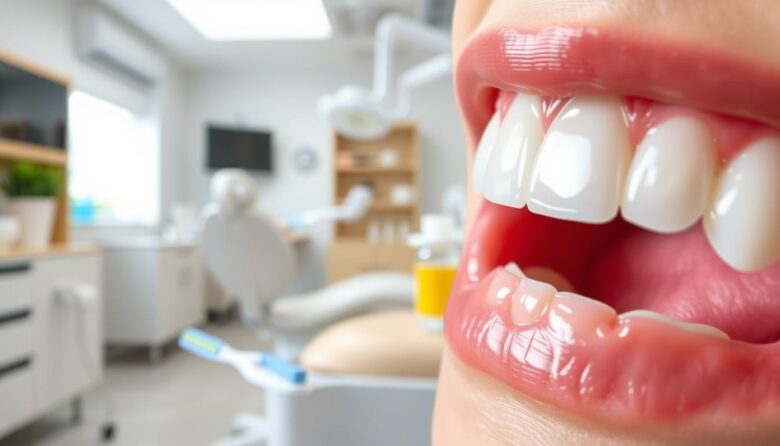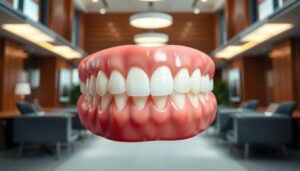Keeping your gums healthy is key for good oral hygiene and overall health. This guide focuses on the importance of gum health care. Many people ignore their gums, but they are vital for supporting teeth and preventing health problems.
This guide offers practical steps and expert tips. It aims to help you take care of your gum health proactively.
Understanding Gum Health and Its Importance
Gum health is key to good oral hygiene. It’s about the soft tissues around and supporting the teeth. Keeping gums healthy ensures a beautiful smile and prevents dental problems. Knowing what healthy gums look like helps with oral care.
What is Gum Health?
Gum health is about the gingival tissues in your mouth. These should be firm, pink, and not inflamed or bleeding. Healthy gums support teeth well and help prevent periodontal disease. Using the right gum health tips is crucial for these tissues.
Signs of Healthy Gums
Knowing the signs of healthy gums is vital for good oral hygiene. Look for:
- Firm texture: Healthy gums are strong and not swollen.
- Pink color: A consistent pink hue is a good sign.
- No bleeding: Gums should not bleed during brushing or flossing.
By watching for these signs, you can check your gum health and act if needed.
Consequences of Poor Gum Health
Ignoring gum health can cause big problems. Gum disease can lead to tooth loss. It can also affect your overall health, like heart disease and diabetes. Knowing these risks shows why good oral hygiene is so important.
Factors That Affect Gum Health
Knowing what affects gum health is key to a healthy smile. Genetics and how well you brush your teeth are important. But, your lifestyle choices also play a big role. Being aware of these factors helps you make better choices for your teeth.
Genetics and Gum Health
Genetics can really impact your gum health. Some people might be more likely to get gum diseases because of their family history. Even with good brushing habits, it can be harder for them to keep their gums healthy.
Knowing your genetic risks is important. It can help you take steps to protect your gums. This might mean seeing the dentist more often or getting a special care plan.
Lifestyle Choices Impact
Your lifestyle choices greatly affect your gum health. What you eat, whether you smoke, and how well you brush your teeth all matter. Eating poorly can weaken your gums, making them more prone to disease.
Smoking also harms your gums. It reduces blood flow and weakens your immune system. Choosing a healthier lifestyle can greatly improve your gum health.
Common Medical Conditions
Some medical conditions can make gum health worse. For example, diabetes can cause inflammation that harms your gums. Autoimmune diseases can also affect your oral health.
Understanding these connections is important. It helps you see how your overall health affects your gums. This knowledge can guide you in finding better gum health solutions.
Daily Oral Care Routine for Healthy Gums
To keep your gums healthy, you need a regular oral care routine. This routine should include brushing, flossing, and choosing the right mouthwash. These steps are key to better gum care.
Brushing Techniques and Tips
Brushing right is the first step in good oral care. Use a soft-bristled toothbrush to avoid gum damage. Here are some brushing tips to help:
- Hold the toothbrush at a 45-degree angle to the gums.
- Use short, gentle strokes rather than applying excessive pressure.
- Spend at least two minutes brushing to ensure all areas are covered.
- Don’t forget to brush the tongue to remove bacteria.
The Role of Flossing
Flossing is vital for gum health. It removes plaque and food particles that brushing can’t get. Add flossing to your daily routine to fight gum disease. Floss once a day, gently moving it between teeth and curving it around each tooth’s base.
Choosing the Right Mouthwash
Choosing a mouthwash with antibacterial properties boosts your oral care. Look for mouthwashes made for gum health. Rinsing with it can kill bacteria that cause plaque.
Professional Dental Care and Gum Health
Keeping your gums healthy is more than just brushing and flossing at home. Regular dental visits are key. These professional checkups help catch problems early, so they can be fixed quickly.
Importance of Regular Checkups
Going to the dentist often can stop small gum issues from getting worse. Dentists do detailed checks and might use X-rays. This helps find gum disease early, making treatment easier and less invasive.
Advanced Treatments for Gum Disease
If gum disease does develop, there are treatments for it. Non-surgical options like scaling and root planing clean the gums. For serious cases, surgery might be needed. This could include grafts or regrowing gum tissue.
Choosing the Right Dental Professional
Finding a good dentist is crucial for gum health. Look for someone with the right skills, experience, and who teaches you about gum health remedies. Talking openly about your concerns and options makes for a better experience.
Nutrition’s Role in Gum Health
Proper nutrition is key to keeping gums healthy. Eating the right foods and nutrients can boost gum health. This section looks at foods good for gums and important nutrients for gum function.
Foods That Promote Healthy Gums
Many foods are great for gum health. These include:
- Fruits and vegetables rich in vitamin C, such as oranges, strawberries, and bell peppers.
- Dairy products like cheese and yogurt, which are excellent sources of calcium.
- Fatty fish containing omega-3 fatty acids, such as salmon and sardines.
- Nuts and seeds, which provide essential minerals and healthy fats.
Nutrients Essential for Gum Health
Some nutrients are crucial for gum health. Key ones include:
- Vitamin C: Supports collagen production and healthy gum tissue.
- Vitamin D: Enhances calcium absorption and maintains bone health.
- Calcium: Essential for strong teeth and bone structure.
- Antioxidants: Help combat inflammation and promote overall oral health.
Foods to Avoid
It’s also important to know which foods can harm gums. Foods to avoid include:
- Processed sugars found in candy and sugary snacks.
- Acidic beverages like soda and fruit juices.
- Refined carbohydrates present in white bread and pastries.
The Connection Between Gum Health and Overall Health
It’s important to understand how gum health affects our overall well-being. Gum disease is not just a mouth problem; it can also impact our body’s health. Studies show a strong overall health link between gum disease and serious health issues, like heart disease.
Gum Disease and Heart Health
Gum disease can increase the risk of heart disease. The bacteria from gum disease can get into the blood, causing inflammation in arteries. This is why taking care of your gums is key to avoiding heart problems.
Impact on Mental Well-being
Poor gum health can also affect our mental health. Research links gum disease to depression and anxiety. People with gum problems might feel less confident and stressed, showing the importance of gum care for our mental health.
Understanding the Oral-Systemic Connection
The connection between oral and systemic health is clear. Bad gum health can signal bigger health issues. Good hygiene and dental care can help prevent these problems, improving both our mouth and overall health.
Recognizing Gum Disease Symptoms
Knowing the signs of gum disease is key to good oral health. Catching it early can stop it from getting worse. Being aware of these signs helps you take care of your gums.
Early Signs of Gum Disease
Spotting gum disease early is vital. Look out for these signs:
- Inflammation and redness in the gums
- Mild bleeding during brushing or flossing
- Persistent bad breath
Advanced Symptoms to Watch For
As gum disease gets worse, symptoms get more serious. Watch for these signs:
- Receding gums, leading to exposed tooth roots
- Formation of deep pockets around teeth
- Significant changes in the bite or tooth alignment
When to See a Dentist
Seeing a dentist is crucial when you notice dental issues. You should make an appointment if you have:
- Chronic pain in the gums or teeth
- Continuous bad breath that doesn’t improve
- Noticeable gum recession or swelling
Spotting gum disease early and knowing its signs leads to better care. Regular dental visits help keep your gums healthy.
Effective Home Remedies for Gum Care
Keeping your gums healthy is key to good oral hygiene. Natural treatments are easy to use and help improve gum care. This section talks about simple home remedies that boost gum health.
Natural Antiseptics for Gums
Natural antiseptics are great for gum care. Tea tree oil and hydrogen peroxide fight bacteria well. Using them regularly can greatly improve gum health, offering a chemical-free way to clean.
Herbal Mouth Rinses
Herbal mouth rinses are gentle alternatives to store-bought products. Chamomile and sage in these rinses reduce inflammation. Adding them to your daily routine can soothe gums and tackle common issues.
DIY Gum Massage Techniques
DIY gum massages boost circulation and health. Massage your gums gently with your fingertips in a circular motion. This simple act improves blood flow and tissue health, helping your gums stay healthy.
Impact of Smoking and Tobacco on Gum Health
Using tobacco harms gum health, causing gum disease and tooth loss. Studies link smoking to gum disease, showing tobacco smoke damages gum tissue and causes inflammation. This makes it hard for gums to heal, making gum health solutions tough to find.
How Tobacco Affects Gums
Tobacco has harmful chemicals that upset the mouth’s natural balance of bacteria. This can lead to more plaque and tartar, creating a perfect environment for gum disease. Here’s how smoking impacts gum tissue:
- Reduced blood flow: Tobacco limits blood flow to gums, making them harder to heal.
- Increased inflammation: Tobacco’s chemicals cause inflammation and gum recession.
- Decreased immune response: Smoking weakens the immune system, making infections harder to fight.
Benefits of Quitting Smoking
Quitting tobacco greatly benefits gum health and overall health. Those who stop smoking see:
- Improved gum health: Better blood flow helps gums recover and lowers gum disease risk.
- Healthier teeth: Less tobacco use means fewer cavities and tooth loss.
- Better breath: Stopping smoking improves oral hygiene and reduces bad breath.
Resources for Tobacco Cessation
Many resources help those trying to quit smoking. Here are some options to consider:
- Tobacco cessation programs: Local organizations offer programs to help quit smoking.
- Hotlines and support groups: Get help and support from professionals or join a group.
- Medications: Talk to a healthcare provider about medications to manage cravings and withdrawal.
Managing Stress for Better Gum Health
It’s important to understand how stress affects gum health. High stress levels can cause inflammation and harm oral hygiene. This makes gums more likely to get sick. So, managing stress is key to keeping gums healthy.
The Link Between Stress and Gum Disease
Studies show that stress can make gum inflammation worse. This increases the chance of getting periodontal problems. Stress makes our body release hormones that fight inflammation less well. This shows why managing stress is crucial for gum health.
Stress Reduction Techniques
Using stress reduction techniques can improve both mental health and gum health. Some effective methods are:
- Mindfulness Meditation: It helps calm the mind and reduce anxiety.
- Regular Exercise: It releases endorphins, which are natural stress fighters.
- Deep Breathing Exercises: They can lower stress and boost overall health.
Importance of Self-Care
Self-care for gums is not just about brushing teeth. It’s also about taking care of your emotional and mental health. Having a self-care routine is essential for a balanced life. It includes relaxing and finding healthy ways to deal with stress. These habits help keep gums healthy and improve your overall well-being.
Maintaining Long-Term Gum Health
Keeping your gums healthy is key to your overall health. It’s important to have a routine that includes daily care and dental visits. Brushing, flossing, and using mouthwash can help prevent gum disease and keep your mouth healthy.
Developing a Sustainable Oral Care Routine
Building a good oral care routine means sticking to dental hygiene and seeing a dentist regularly. Regular cleanings and check-ups help you stay on track with your gum health. Brushing right and flossing every day also helps keep your gums healthy.
Setting Realistic Gum Health Goals
Setting goals for your gum health helps you track your progress. Goals like brushing for a certain amount of time or eating less sugar can improve your oral health. These goals help you stay motivated and care for your gums consistently.
Staying Informed and Updated on Gum Health Research
It’s also important to stay up-to-date with gum health research. Learning about new findings and best practices helps you make better choices. This knowledge helps you avoid risks and take steps to prevent problems, keeping your oral care routine strong.




